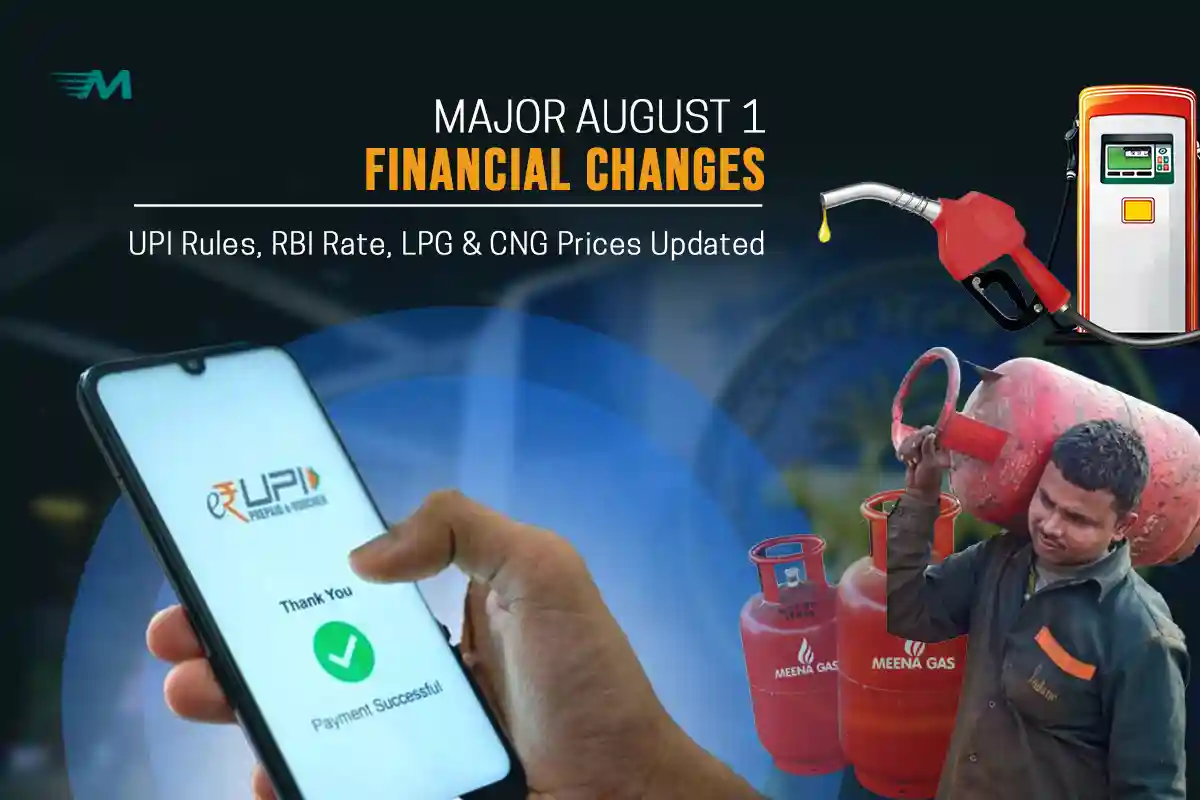Major August 1 Financial Changes: UPI Rules, RBI Rate, LPG & CNG Prices Updated
A New Financial Chapter Begins
August 1, 2025, marks a fresh beginning in India’s financial landscape. From new UPI transaction rules and revised RBI repo rates to updated LPG and CNG prices, several important updates have come into effect.
These August 1 Financial Changes directly impact your wallet. Whether you’re a salaried professional, small business owner, or investor, these changes could significantly affect how you spend, save, and plan your monthly budget. Staying informed about such financial reforms is essential for smart money management and financial planning.
Let’s explore all the major financial changes you need to be aware of starting this August.
1. New UPI Rules: Stricter Compliance & Enhanced Security
The Reserve Bank of India has revised the Unified Payments Interface (UPI) guidelines to enhance security and reduce fraud. Here’s what changes from August 1:
- Inactive UPI IDs will be deactivated: Any UPI ID that hasn’t been used for more than a year may be disabled by the bank or app provider.
- Pre-transaction authentication: UPI apps will prompt additional verification for high-value transactions, adding a layer of protection.
- Transaction Limit Monitoring: Daily and monthly limits have been made more visible on UPI apps for better user control.
These changes aim to make the UPI ecosystem more transparent and user-friendly while ensuring safety against cyber fraud, a key concern as digital transactions dominate the Indian economy.
2. RBI Repo Rate: Status Quo, But Market Watching Closely
At its monetary policy meeting held in July, the Reserve Bank of India decided to keep the repo rate unchanged at 6.50%. The repo rate is the rate at which the RBI lends money to commercial banks, and any change here can affect your loan EMIs and savings interest rates.
While the rate remains unchanged for now, experts suggest that inflation data and global trends might trigger a rate change in the coming months. Here’s what this means for you:
- Home loan EMIs are unlikely to change immediately.
- Fixed deposit (FD) interest rates may remain stable.
- Market sentiment continues to be cautious, especially for equity and bond investors.
For borrowers and savers alike, keeping an eye on the RBI’s future announcements is crucial.
3. LPG Prices Revised: Household Budgets to Adjust
Oil marketing companies have revised Liquefied Petroleum Gas (LPG) prices, as they typically do at the beginning of each month. Effective from August 1:
- The price of 14.2 kg domestic LPG cylinders has increased by ₹20 in major cities.
- Commercial LPG cylinders (19 kg) have also seen a hike of around ₹30.
This change affects household monthly budgets, especially for middle-income families. Government subsidies (where applicable) may offer some relief, but for many consumers, this means stretching their household expenses a bit more.
4. CNG Price Updates: Regional Changes Affect Daily Commute
Several states have revised their Compressed Natural Gas (CNG) prices, citing changes in input costs and international fuel prices.
- In Delhi NCR, the CNG price has been increased by ₹2.50 per kg.
- Other metros like Mumbai and Pune have also reported marginal hikes.
This is particularly important for cab drivers, auto-rickshaw operators, and fleet owners. Any rise in CNG prices often leads to higher transportation costs, which could gradually reflect in consumer product prices too.
5. Other Financial Highlights: What Else is New?
Apart from the big updates above, here are some other notable financial changes and alerts for August 2025:
- EPF Withdrawal Update: The Employees’ Provident Fund Organisation (EPFO) has introduced faster settlement timelines for online claims, aiming to process them within 3 working days.
- Income Tax Scrutiny Notices: The Income Tax Department has started dispatching scrutiny notices for AY 2024–25. Taxpayers are advised to check their email and login to the portal for updates.
- New PAN-Aadhaar Linking Penalties: A late fee of ₹1000 will now be charged for PAN-Aadhaar linking beyond the July 31 deadline, affecting users filing tax returns.
These smaller updates are equally important and should not be overlooked.
How These Financial Changes Affect You
Here’s a quick breakdown of how these updates may affect different individuals:
| User Type | Impact Summary |
| Salaried Employee | Higher fuel and LPG prices may increase monthly expenses |
| Business Owner | Stable repo rate offers no relief on loans; transport cost may rise |
| Investor | Market remains cautious; no significant interest rate shifts |
| Homemaker | Budget planning becomes tighter due to LPG cost hike |
| Commuter | Higher CNG prices could affect daily travel and transport fares |
Smart Tips to Navigate These Changes
To manage your finances better in light of the August 1 updates, here are some quick tips:
- Review your monthly budget to accommodate higher fuel or LPG prices.
- Use UPI securely by updating your app, passwords, and disabling unused UPI IDs.
- Compare FD rates if you’re saving; stable repo rates mean now is a good time to lock in.
- Watch inflation trends and RBI updates for potential repo rate revisions.
- Claim EPF early if eligible, given faster settlement times.
Being proactive with these small adjustments can help you maintain financial stability amid changing economic policies.
Conclusion: Stay Aware, Stay Prepared
Financial changes like the ones seen this August can feel overwhelming, especially when they touch different aspects of your day-to-day life. However, August 1 Financial Changes serve as a reminder that being informed is the first step to being prepared. Whether it’s adjusting to new UPI norms, keeping track of fuel expenses, or watching RBI’s repo rate decisions, staying updated ensures smarter financial decisions.

